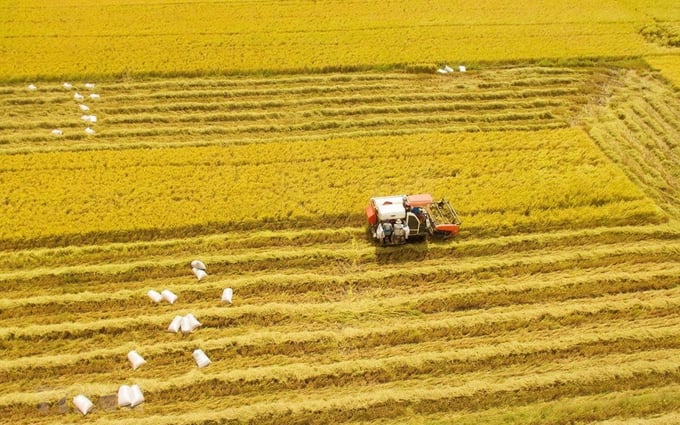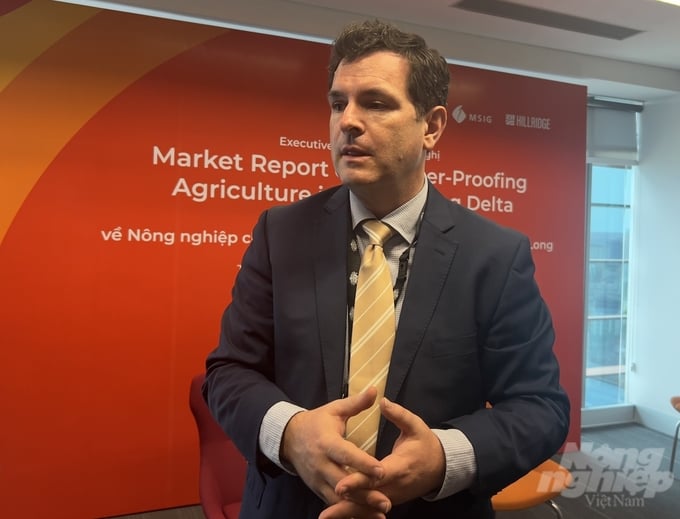May 26, 2025 | 14:15 GMT +7
May 26, 2025 | 14:15 GMT +7
Hotline: 0913.378.918
May 26, 2025 | 14:15 GMT +7
Hotline: 0913.378.918

According to the Market Report, rice production activities in An Giang province face significant climate change risks in July and August, whereas rice production activities in Kien Giang province is vulnerable to the impacts of climate change in October and November. Photo: Le Hoang Vu.
During a meeting at the Australian Consulate General in Ho Chi Minh City on May 28, Mr. Dominic Balasuriya, Economic Consul at the Department of Foreign Affairs and Trade of Australia (DFAT), stated that the world is shifting its attention towards in-depth research in order to mitigate the impacts of climate change, and explore climate change adaptation solutions.
The Australian government introduced a new development policy in 2023, identifying climate change and gender equality as the focus of all strategies in the foreseeable future.
"We are seeking new technologies such as commercially viable solutions to support small-scale, local farmers in the current global context; and respond to the impacts of climate change with a focus on achieving net-zero emissions," emphasized Mr. Dominic Balasuriya. He leads an action team for an Australian government initiative titled Business Partnerships Platform (BPP), which aims to develop innovative business initiatives in the Mekong Delta region.
According to the Market Report on Weather-Proofing Agriculture in the Mekong Delta, the Mekong Delta is a key agricultural production area within Vietnam. However, the region is facing severe climate risks, including irregular rainfall, high temperatures, storms, droughts, and saltwater intrusion.
Facing climate change, farmers whose livelihoods primarily depend on agriculture and aquaculture are the most vulnerable.
The report indicated that nearly half of the total production value in the Mekong Delta region is relatively resilient to severe climate phenomena, including production value from fish farming, indoor and greenhouse production, dry season production in irrigated, non-coastal areas.
However, other agricultural and aquaculture production models are susceptible to climate risks. Among this group, a production value of up to 6.8 billion USD is eligible for index insurance.
The report also provided an analysis on the agricultural environment in the Mekong Delta. Accordingly, the analysis highlighted rice, mangoes, durians, dragon fruits, oranges and shrimp as the most suitable products for index insurance due to their sensitivity to climate risks.
According to the report, index insurance can be an important solution in mitigating climate risks, and establishing a protection network against the impacts of severe climate phenomena for farmers in the Mekong Delta.

Dale Schilling, CEO and Founder of Hillridge Technology Pty Ltd. Photo: Nguyen Thuy.
Dale Schilling, CEO and Founder of Hillridge Technology Pty Ltd, revealed that approximately 40% of the total agricultural production value in the Mekong Delta can be protected by index insurance. Products under index insurance can mitigate climate risks by triggering an automatic payment system when rainfall or temperature thresholds are exceeded without the need for extensive damage assessments. This approach allows farmers and aquaculturists to receive compensation to restore production immediately after a natural disaster.
This initiative is part of a collaboration project between Hillridge, MSIG Vietnam, and DFAT, under the Business Partnerships Platform program, aimed at developing and promoting insurance solutions tailored to the needs of farmers in the Mekong Delta.
An important aspect of the project is to enhance insurance access for smallholder farms led by women and other vulnerable groups heavily affected by climate change but lacking resources to recover from its impacts.
Cargill Group and the Asia Society for Social Improvement and Sustainable Transformation (ASSIST) announced their partnership and launched the Aqua Xanh project on May 8 in Ca Mau city. Accordingly, the project aims to reduce water pollution by promoting the implementation of sustainable aquaculture practices in the Mekong Delta.
The Aqua Xanh project will be implemented from May 2024 to July 2026, with the primary objective of reinforcing climate change resilience. The project will undergo a pilot phase in Cai Nuoc district, Ca Mau province, as a precursor to potential expansion into other regions.
The project is consistent with Cargill's global sustainable development objectives by positively impacting water sources, supply chains, and local communities throughout its operation.
The Aqua Xanh project aims to address climage challenges by promoting sustainable water usage and waste management practices in the Mekong Delta's fisheries sector. One of the project's objectives is to enhance farmers' capacity through training and technical support in sustainable practices in accordance with the standards set by the Aquaculture Stewardship Council (ASC).
Translated by Nguyen Hai Long
/2025/05/25/4127-3-073637_820.jpg)
(VAN) Thanks to the promotion from an FAO-implemented project, vegetable production in greenhouses in Moc Chau has seen strong development, from 1.5 hectares in 2021 to nearly 50 hectares in 2024.

(VAN) FAO has recently supported USD 140,000 to implement the project 'Risk mitigation human-animal interface risks through disease control initiatives in pig farming.'

(VAN) The People's Committee of Tra Vinh province has approved an adjustment to the investment policy for the Green Hydrogen Plant project, increasing its area to approximately 52.76 hectares.
![Reducing emissions from rice fields: [2] Farmers’ commitment to the soil](https://t.ex-cdn.com/nongnghiepmoitruong.vn/608w/files/news/2025/05/05/dsc08881jpg-nongnghiep-140632.jpg)
(VAN) Clean rice cultivation model in Thuong Tan commune, Bac Tan Uyen district, is assisting local residents in achieving sustainable agriculture by substantially reducing costs, increasing productivity, and protecting the environment.

(VAN) At the conference to disseminate Resolution No. 68, AgriS introduced its digital agricultural ecosystem and reaffirmed its commitment to accompanying the Government in promoting private sector development and sustainable agriculture.

(VAN) 'Blue Ocean - Blue Foods' initiative is designed to restore marine ecosystems and establish sustainable livelihoods for local communities by cultivating a minimum of 1,000 hectares of cottonii seaweed in the first three years.
/2025/05/21/4642-3-112707_603.jpg)
(VAN) The V-SCOPE project has made direct contributions to three out of six pillars of the Comprehensive Strategic Partnership between Vietnam and Australia.